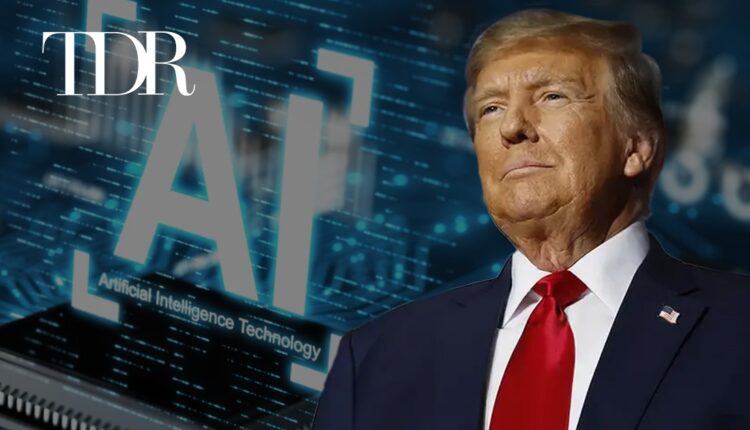
Trump’s AI Policy: Innovation and Ethical Concerns
The TDR Three Key Takeaways regarding Trump’s AI Policy and Innovation:
- Trump’s AI policy emphasizes deregulation and aligning AI development with American values, countering Biden’s executive order on AI.
- The policy raises concerns about balancing innovation with ethical standards, especially in competition with China.
- Trump’s engagement with tech experts and industry leaders aims to enhance U.S. AI capabilities, reflecting growing support within the tech industry.
Former President Donald Trump is once again in the spotlight, this time with his stance on artificial intelligence (AI). The debate surrounding Trump and AI innovation highlights a complex interplay of political, technological, and ethical considerations.
The GOP’s platform outlines a plan to repeal President Biden’s executive order on AI, positioning Trump’s approach as a counterbalance to what they describe as radical left-wing constraints. The platform states, “We will repeal Joe Biden’s dangerous Executive Order that hinders AI innovation and imposes radical leftwing ideas on the development of this technology. In its place, Republicans support AI development rooted in free speech and human flourishing.”
Trump’s perspective on AI reflects his broader America First ideology. His stance emphasizes deregulation, free-market principles, and a competitive edge against global adversaries, particularly China. The narrative here is clear: AI innovation should align with American values and national interests. This approach, however, raises significant questions about the balance between innovation and regulation, particularly concerning ethical AI development.
The America First Policy Institute (AFPI), has sought to clarify its position on the matter. Hilton Beckham, a spokeswoman for AFPI, stated, “AFPI does not coordinate with or represent any candidate or campaign. We receive thousands of policy ideas from across the country each month. This document is an example of those ideas.” This disclaimer underscores the diversity of views within the conservative movement regarding AI policy.
Artificial intelligence (AI) has sparked global debate, with countries striving to balance its potential benefits against the associated risks. Former President Trump’s approach, emphasizing free speech and human flourishing, indicates a preference for prioritizing innovation over caution. This stance is further complicated by ongoing geopolitical tensions. Venture capitalist Ben Horowitz, who endorsed Trump, shared insights on their podcast, recounting Trump’s strategic perspective on AI: “AI is very scary, but we absolutely have to win,” Trump reportedly said. “Because if we don’t win, then China wins, and that’s a very bad world.”,reported in The Washington Post.
Trump has reportedly discussed with Silicon Valley experts the need for increased energy to support AI development, emphasizing the competitive threat posed by China. In subsequent discussions, tech investors highlighted the importance of Trump surrounding himself with knowledgeable individuals in technologies such as AI and nuclear power. Chamath Palihapitiya, founder of the venture capital firm Social Capital, noted that Trump’s support within the tech industry has grown since 2016, suggesting that if Trump can assemble a team of highly technical and thoughtful individuals, there could be significant advancements.
Trump’s AI policy emphasizes deregulation and free speech, raising questions about AI ethics and global competitiveness. Balancing innovation and regulation will be crucial as AI evolves, impacting the future of technology and society. The potential for AI to transform various sectors is undeniable, but the debate over its governance remains equally critical. Want to be updated on Cannabis, AI, Small Cap, and Crypto? Subscribe to our Daily Baked in Newsletter!



